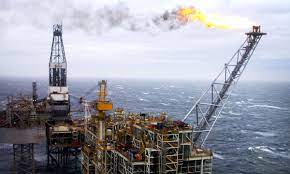Britain approved a significant oil and gas project on Wednesday despite UN and scientific advisories that the world must stop developing new fossil fuel resources if it is to prevent a catastrophic climate change.
The Rosebank field, located around 130 kilometers (80 miles) northwest of the Shetland Islands, can now be developed thanks to a decision by the North Sea Transition Authority. Equinor and Ithaca Energy are the field’s owners. The authority is a British regulatory body tasked with maximizing the financial gains from Britain’s North Sea energy resources as well as assisting the nation in achieving its targets for lowering carbon emissions.
The choice was made at a time when Prime Minister Rishi Sunak’s administration is under fire for softening its environmental commitments in front of an election that is anticipated to take place next year. Following the unpopularity of some voters with costly environmental programs, Sunak recently advocated delaying a ban on gasoline and diesel-powered vehicles and loosening water quality regulations for developers.
In order to increase domestic oil and gas output, manage consumer costs, and provide “energy security” as the nation transitions from fossil fuels to renewable energy sources like wind and solar, the government of Britain claims that projects like Rosebank are necessary.
The decision was deemed “morally obscene” by Caroline Lucas the sole member of the Green Party in the House of Commons, at a time when the climate situation is becoming “more and more serious.”
She stated that while Britain should keep pumping oil and gas from its current operations, it shouldn’t be opening up new areas.
Rosebank, according to Lucas, won’t increase energy security or lower costs because the majority of the oil will be sent abroad, and what oil does return to Britain will be sold at market rates.
“Letting highly subsidized, foreign-owned fossil fuel goliaths extract more oil and gas from these islands and sell it to the highest bidder overseas doesn’t deliver energy security and lower bills,” she said.
As production drops at the nation’s aging North Sea oil fields, Sunak announced plans to issue hundreds of new oil and gas licenses in July to protect jobs and increase Britain’s energy independence.
Over the past 25 years, production from Britain’s North Sea resources, which were first developed in the early 1970s, has slowly decreased. May production from the fields was comparable to around 1.3 million barrels per day, a 75% decrease from the high in December 1996.
Rosebank, one of the largest undeveloped oil fields in British territorial seas, is thought to contain 300 million recoverable barrels of oil, according to Equinor.
The two partners want to invest $3.8 billion in the project, sustaining around 1,600 jobs at the height of development, according to Norway-based Equinor, which controls 80% of Rosebank. In 2026–2027, the project’s initial phase of production will start.
Rosebank and other recent developments, according to the government, will be “significantly less emissions-intensive than previous developments.”
The government stated that continuing North Sea production was crucial for ensuring domestic supply security and making the United Kingdom less susceptible to a rerun of the energy crisis that drove up prices following Russia’s illegitimate invasion of Ukraine.
Sunak last Monday postponed the government’s proposal to outlaw the sale of new gasoline and diesel vehicles until 2035, five years later than originally anticipated.
That happened after Sunak’s Conservative Party won the by-election to fill a vacancy in the House of Commons by capitalizing on public resentment over a new pollution fee for drivers in London. After 13 years in power, the party is currently in the rear of most surveys; therefore, reviewing environmental programs has since grown to be a crucial subject.
The administration asserts that it is still committed to achieving its goal of getting rid of net carbon emissions by 2050.
Energy Secretary Claire Coutinho stated in a statement that using domestic resources from North Sea areas like Rosebank makes sense since “we are investing in our world-leading renewable energy but… we will need oil and gas as part of that mix on the path to net zero.”
Recent decisions, according to Susannah Streeter, head of money and markets at Hargreaves Lansdown, cast doubt on the government’s dedication to its environmental goals and could lead businesses to postpone necessary investments in renewable energy.
When it comes to government support for the green transition, it “muddies the playing field once more,” she added, and “leads to more uncertainty for companies and investors focused on cleaner energy solutions.”
From January 2021 to March 2022, energy corporations approved investments totaling $166 billion in new oil and gas projects, according to research by Carbon Tracker, a think tank devoted to monitoring actions that contribute to climate change.
To preserve chances of lowering global warming to no more than 1.5 degrees Celsius (2.7 degrees Fahrenheit) over pre-industrial levels, the U.N.’s panel on climate change says countries must stop new fossil fuel exploration and production.
U.N. Secretary-General Antonio Guterres stated in June that “fossil fuel industry transition plans must be transformation plans that chart a company’s move to clean energy—and away from a product incompatible with human survival.” Otherwise, they are simply suggestions for ways to destroy the earth more effectively.
SPONSORED:

















